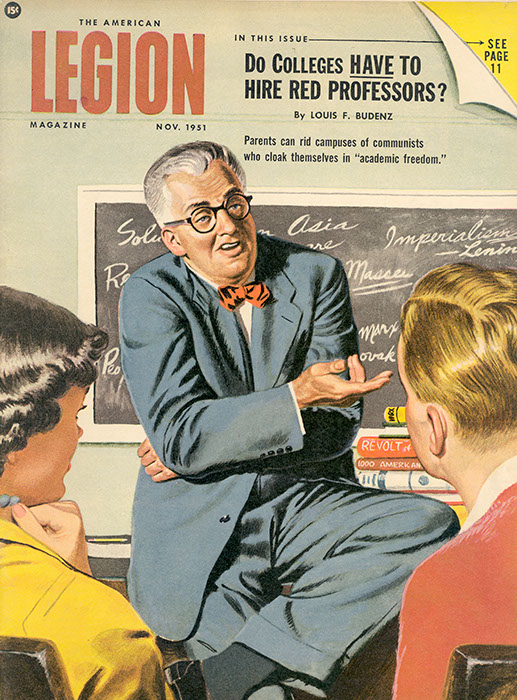
In 1938, in response to attacks on academic freedom, Sarah Lawrence College’s Board of Trustees passed a Statement on Academic Freedom. Little did they know that only a decade later, nationwide assaults on academic freedom would become commonplace with the onset of the “McCarthy Era.” Beginning in 1949, a national debate focused on attempts to dismiss Communist Party members from teaching positions and implementing loyalty oaths for faculty at colleges and universities. This marked the beginning of what is now referred to as McCarthyism. The attacks on Sarah Lawrence began with the publication of The American Legion Magazine article by Louis Budenz in November, 1951 naming Sarah Lawrence, along with other colleges and universities across the country, for employing “subversive” and “communist” faculty members. Following this article, in late 1951, the newly formed Americanism Committee of the Westchester County American Legion began accusing Sarah Lawrence faculty members of being communists. In response to these preliminary attacks, the Board of Trustees reaffirmed the college’s 1938 Statement on Academic Freedom. Unfortunately, this was only the beginning. These attacks from the Legion would continue throughout the 1950s.
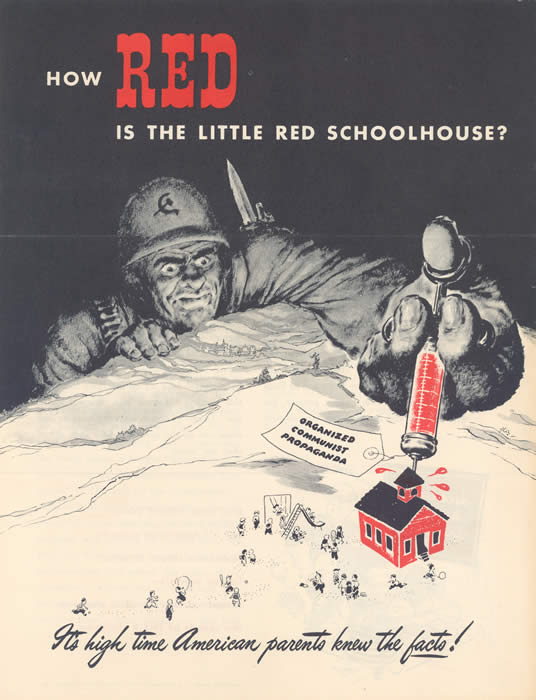
On a regular basis, the Legion would present a report from the Americanism Committee targeting individual faculty members at Sarah Lawrence whom they believed to be communists. The reports began with accusations that Joseph Barnes was a communist. The Legion went on to target nearly a dozen faculty members at Sarah Lawrence. Sarah Lawrence was not alone in this fight. The Legion assaulted faculty at other major educational institutions in the country including Amherst, Harvard, Wellesley and the University of Chicago. In addition, the Legion brought these charges to the Senate Internal Security Subcommittee (also known as the Jenner Committee for Senator William E. Jenner of Indiana who chaired the committee). It became the focus of this committee to accuse members of the teaching community of communist and subversive activities. As a result, numerous faculty members were called before the Senate Subcommittee.
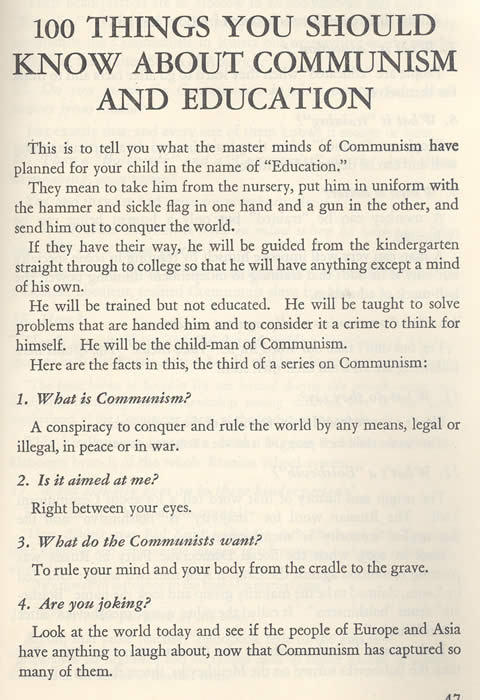
Support for the College, in response to these attacks and charges, came from various members of the community including residents of Bronxville, Yonkers and Eastchester, the American Civil Liberties Union, the students of Sarah Lawrence, as well as parents and alumnae/i. Throughout the ordeal, Harold Taylor and the Board of Trustees stood by their faculty and did their best to calm the effects of such attacks. The reaction by President Taylor and the Board of Trustees is considered by historians to be an exception, thereby attesting to Sarah Lawrence’s continued commitment to individualism.
Sarah Lawrence College Faculty Targeted By American Legion, US Senate
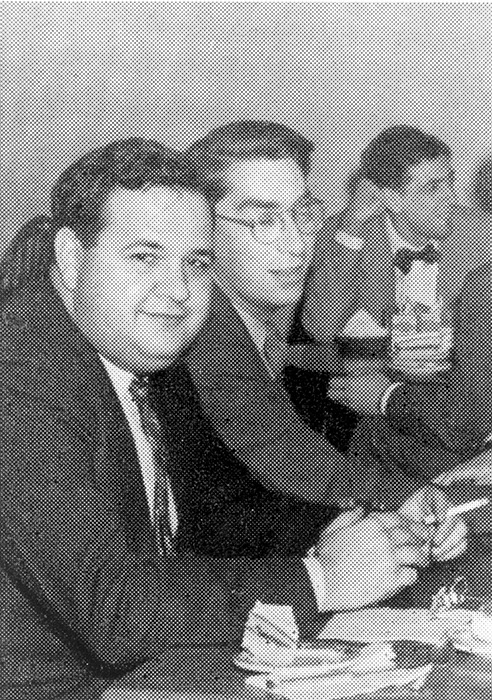
The American Legion and Senate Subcommittee targeted several members of the Sarah Lawrence faculty totaling 18 by the end of the 1950's. The following faculty, and former faculty, were accused of Communist affiliations or called before the Senate Subcommittee during the McCarthy era.
Paul Harvey Aron (1921-1991)
History Faculty, 1948-1953
Questioned by the Senate Subcommittee in a March 20, 1953 closed session in which he invoked the Fifth Amendment. He resigned, as a result of the hearing, on April 8, 1953. In his defense, the Student Council passed a statement of support on April 2, 1953. Bard College faculty also sent a statement of support to Harold Taylor along with numerous letters from students.
Joseph Barnes (d.1970)
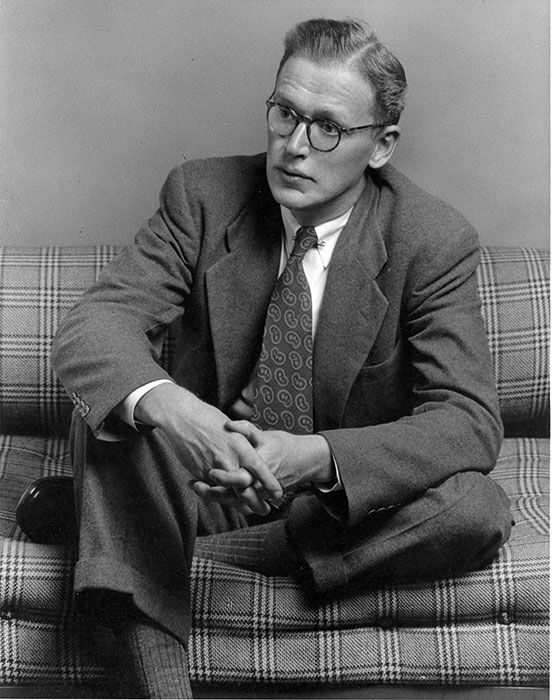
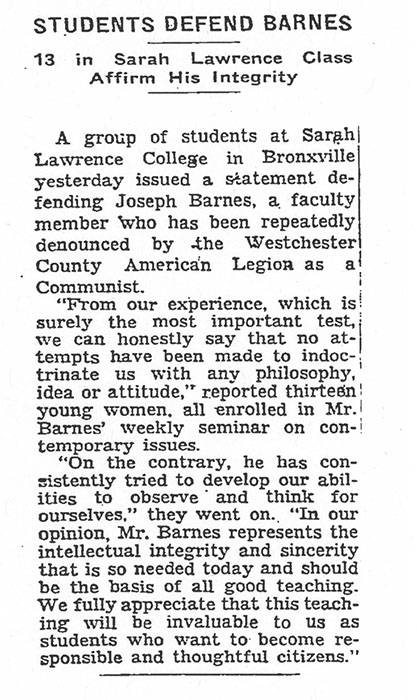
Social Science Faculty, 1950-1952
Even though he was not called before the Senate Subcommittee under Jenner’s chairmanship, he did appear before the Senate Subcommittee under the chairmanship of Senator McCarran earlier in the 1940s. In addition, the American Legion launched a vicious attack on his alleged Communist affiliations stating that five witnesses identified him as a Soviet agent, one of which was Whittaker Chambers. No formal charges were ever brought against him.
In response to the American Legion, Barnes wrote a statement that was published in the New York Times in April, 1952 stating that he never supported nor belonged to the Communist Party. His students at Sarah Lawrence wrote a statement, published in the New York Times, in support of Barnes in April, 1952.
Adele Brebner (1897-1960)
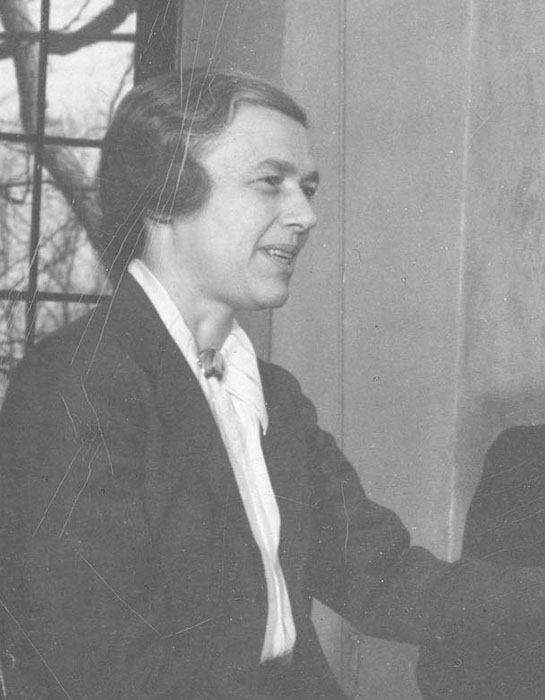
Literature Faculty, 1930-1960
Called before the Senate Subcommittee sometime before October, 1953, but was ill at the time of the subpoena and was not called again. No further information is known.
Irving Goldman (1911-2002)
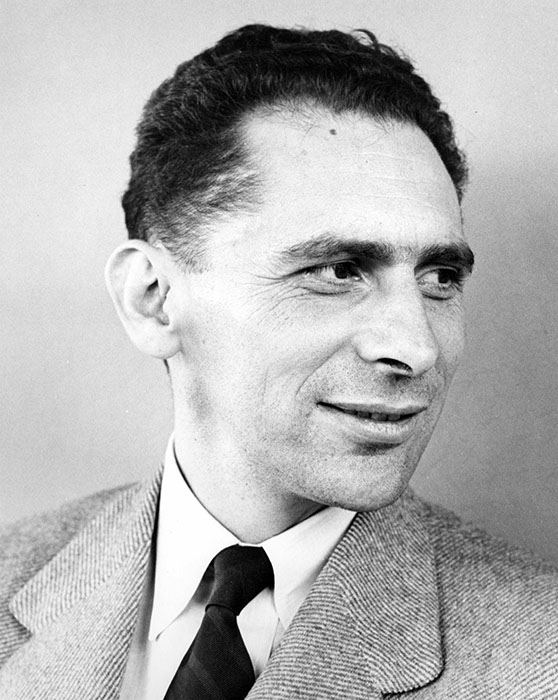
Anthropology Faculty, 1947-1981
Goldman appeared in an executive session of the Senate Subcommittee on March 20, 1953 and at a public hearing on April 1, 1953. Students wrote a statement through the Student Council in support of Goldman.
As reported in The Campus on April 13, 1953, four Sarah Lawrence students attended Irving Goldman's open hearing in Washington of the Senate Internal Security Subcommittee.
Madeleine Parker Grant (1895-1981)
Biology Faculty, 1933-1963
Listed in a letter to Harold Taylor from the Senate Subcommittee, but was not actually called. No further information is known.
Horace Gregory (1898-1982)
Poetry Faculty, 1934-1960
Appeared before the Senate Subcommittee on March 20, 1953 in executive session in which he testified that he had never been a member of the Communist Party.
Bert James Loewenberg (1905-1974)
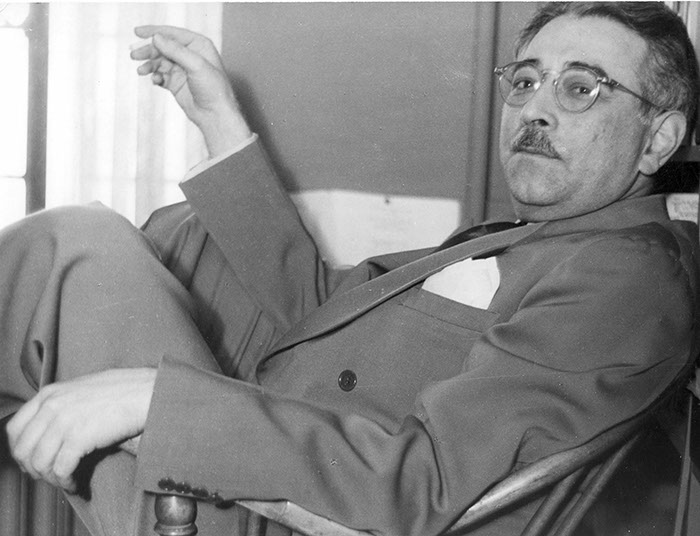
History Faculty, 1942-1971
Director of Center for Continuing Education, 1965-1969
Targeted, along with Harold Taylor, Esther Raushenbush and Helen Merrell Lynd, by the American Legion in 1956 for work with the Encampment for Citizenship at the Fieldston School. At the same time, the Legion accused Loewenberg of being involved in the “infamous Waldorf Peace Conference in New York City in 1949.” A subpoena was issued to Loewenberg by the Senate Subcommittee to appear in an executive session on March 20, 1953, but he could not be served since he was in England at the time. It is unclear whether he was subpoenaed again. In addition, Loewenberg was denied a Fulbright Fellowship twice, allegedly due to “loyalty issues.” Harold Taylor wrote letters to the Chair of the Board of Foreign Scholarships of the State Department, the board responsible for selecting Fulbright Fellows, protesting the rejections of Loewenberg. Eventually, in May 1960, he was awarded the Fulbright Fellowship after the American Historical Association called for a review of his case by the State Department.
Helen Merrell Lynd (1896-1982)
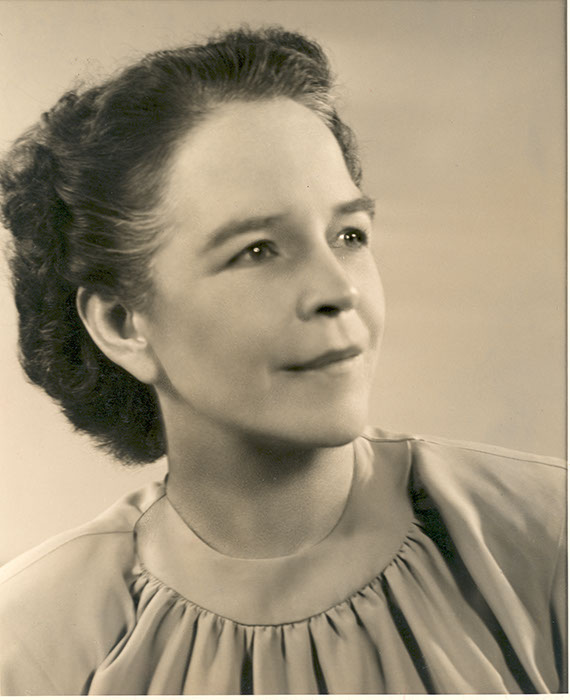
Sociology Faculty, 1929-1964
Attacked by the American Legion for being a member of various “communist-front organizations.” On March 20, 1953, Lynd appeared before the Senate Subcommittee in an executive session in which she informed them that she has never been a member of the Communist Party and does not know of any Communists on the Sarah Lawrence faculty.
Lois Barclay Murphy (1902-2003)
Psychology Faculty, 1928-1952
Appeared before the Senate Subcommittee in an executive session on March 20, 1953 in which she testified that she had never been a member of the Communist Party. She subsequently wrote a response to Senator Jenner in late March, 1953.
Muriel Rukeyser (1913-1980)
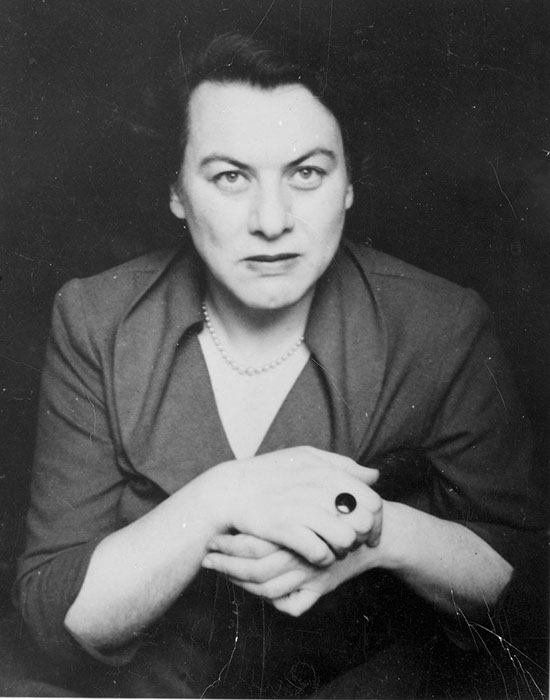
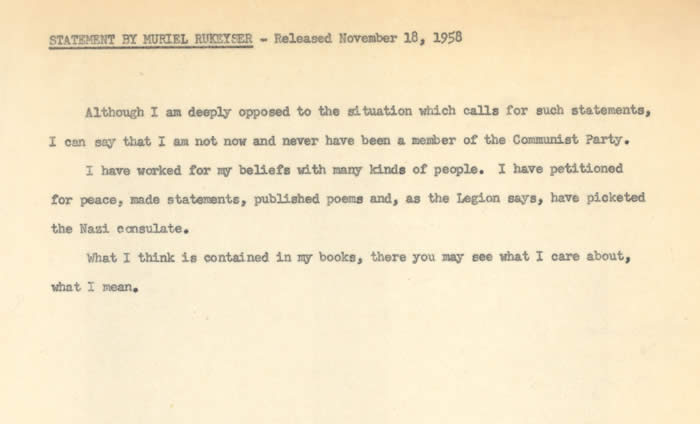
Literature Faculty, 1955-1967
Accused by the American Legion of Westchester in November, 1958 of being involved with various Communist organizations. In response to the charges made by the American Legion, Muriel Rukeyser released a statement to the public on November 18, 1958.
Marc Slonim (1894-1976)
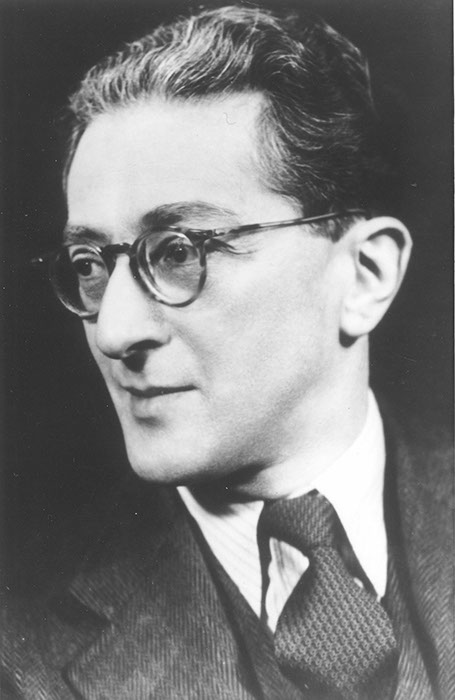
Literature Faculty, 1943-1962
Director of Foreign Studies, 1962-1968
European Consultant for Foreign Studies, 1968-1976
Appeared before the Senate Subcommittee on March 20, 1953 in executive session in which he informed the committee that he had never been a member of the Communist Party and did not know of any Communists on the Sarah Lawrence faculty.
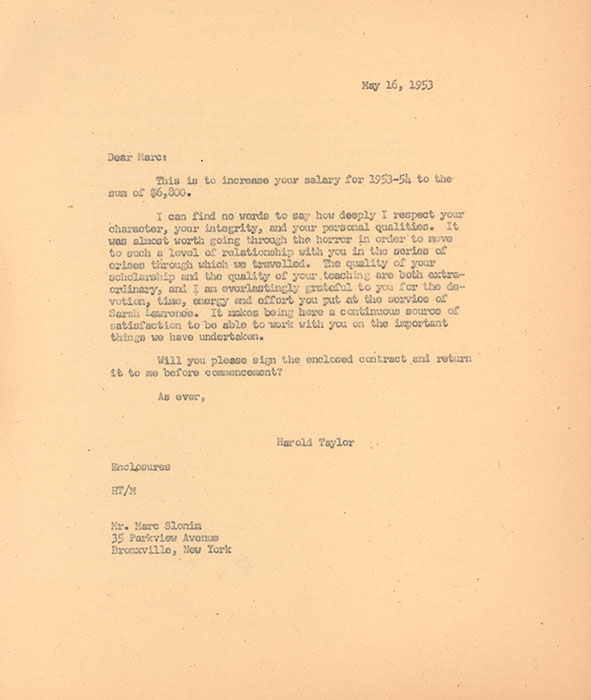
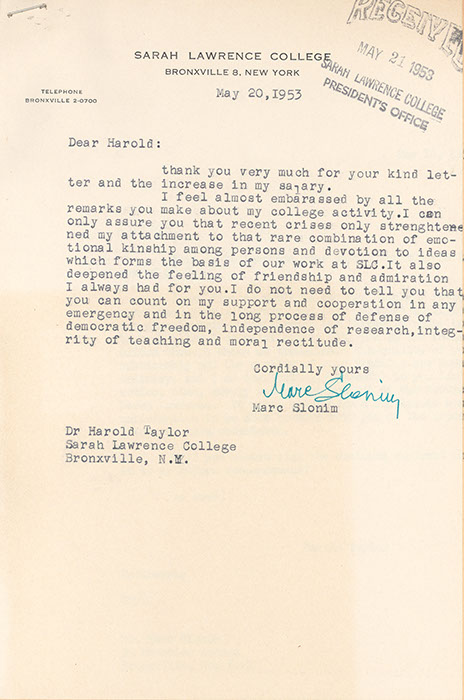
Charles Trinkaus (1911-1999)
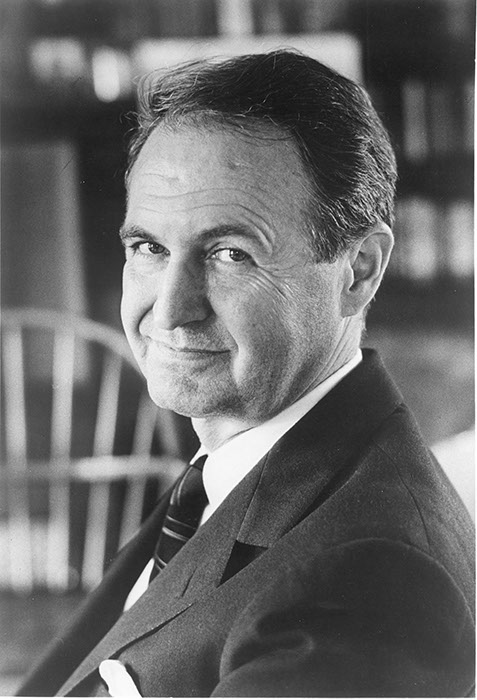
History Faculty, 1936-1970
In May, 1952, the American Legion attacked Trinkaus for sponsoring the World Peace Conference in 1949 and being associated with the Jefferson School of Social Science. On June 4, 1953 he appeared before the Senate Subcommittee in which he informed the Committee that he was not currently a member of the Communist Party, but invoked the Fifth Amendment about his former membership. The public hearing set up after this was postponed indefinitely.
Former Sarah Lawrence Faculty Accused
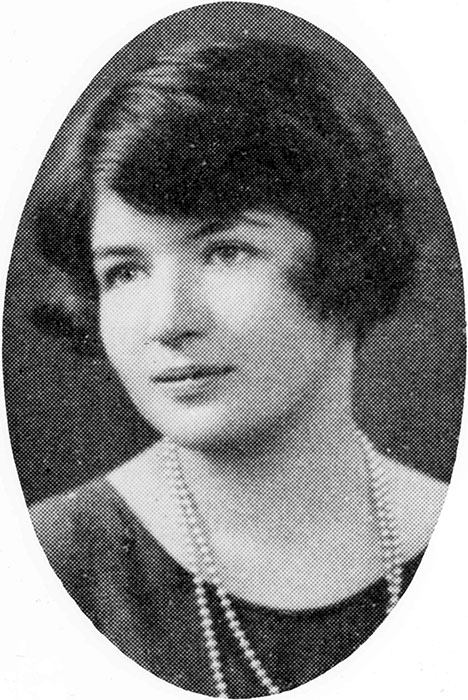
Mary Dublin Keyserling (1910-1997)
Economics Faculty, 1933-1938
Accused, along with her husband, Leon Keyserling, by Senator McCarthy directly, of being a member of an “unlimited number of” Communist-front organizations in February, 1952. At the time of the accusation, Dublin was no longer on the faculty of Sarah Lawrence College. Her career after Sarah Lawrence included work at the National Consumers League and in the House Committee on National Defense Migration.
Genevieve Taggard (1894-1948)
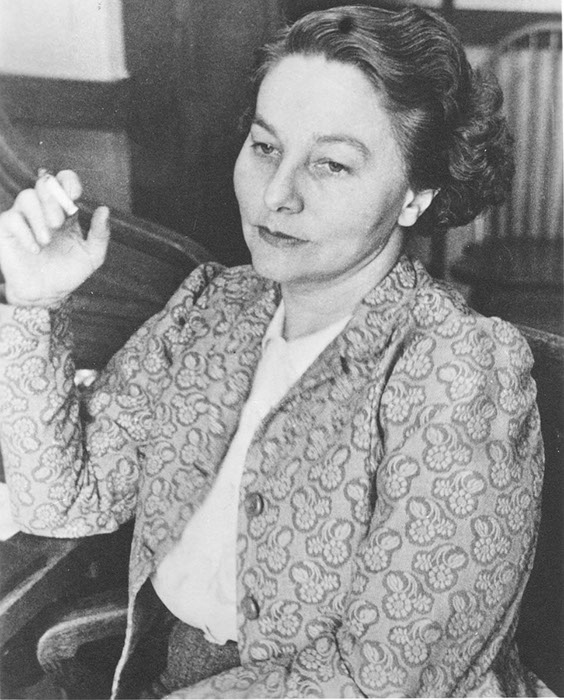
Poetry and Literature Faculty, 1935-1946
Accused, posthumously, of being a Communist.
Oliver S. Loud (dates unknown)
Science Faculty, 1936-1940
Accused by the American Legion in May, 1952 of being a Communist.
Horace Grenell (1909-?)
Music Faculty, 1934-1941
Accused by the American Legion in May, 1952 of being a communist due to his affiliation with the Jefferson School of Social Science. At the time, he was no longer a member of the Sarah Lawrence faculty.
Mitchell Grayson (1913-?)
Consultant in Radio, 1948-1949
Attacked by the American Legion in May, 1952 for contributing to the Daily Worker and of signing communist petitions in 1939 and 1940. The Senate Subcommittee requested that he appear in an executive session on March 20, 1953, but since he was no longer a member of the Sarah Lawrence faculty at the time, he was not subpoenaed.
Jean Trepp (1909-1998)
Economics Faculty, 1932-1945
Requested to appear in an executive session of the Senate Subcommittee on March 20, 1953, but was no longer with Sarah Lawrence College at the time.Faculty Responds To Accusations
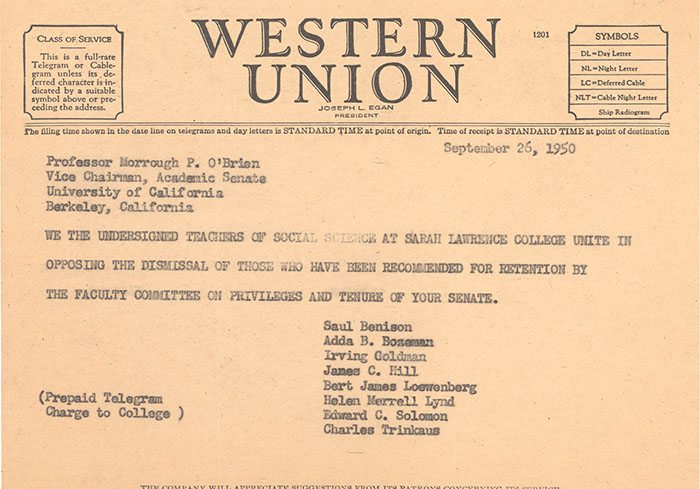
Students Fight Back
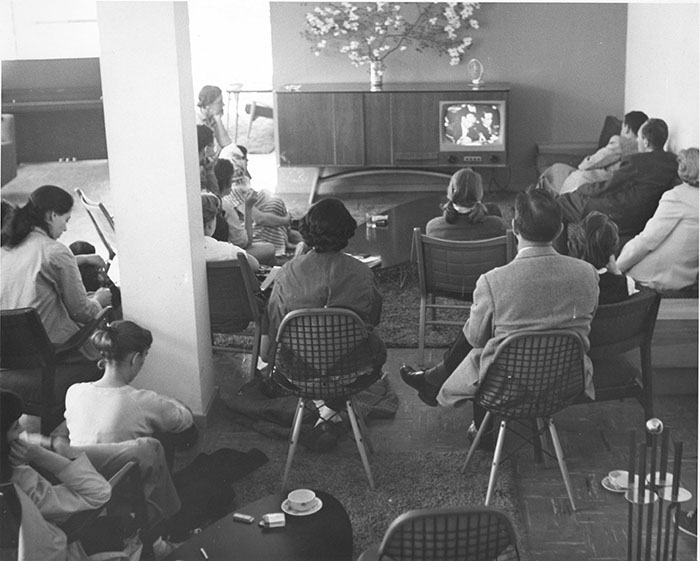
Beginning in 1951, with the attacks on Sarah Lawrence College and its faculty by the Westchester County American Legion, Sarah Lawrence students immediately responded in favor of their beloved faculty. Not only did the students, individually and collectively through the Student Council, publish statements supporting the faculty and the College (in both The Campus and The New York Times), but they also remained aware of the ever-changing political scene by becoming active in national politics. Students invited various personalities related to the defense of academic freedom to speak at the College during the 1950s. The staff of The Campus printed articles in every issue updating students on the attacks. In addition, students barraged President Harold Taylor with letters in support of the faculty members targeted.
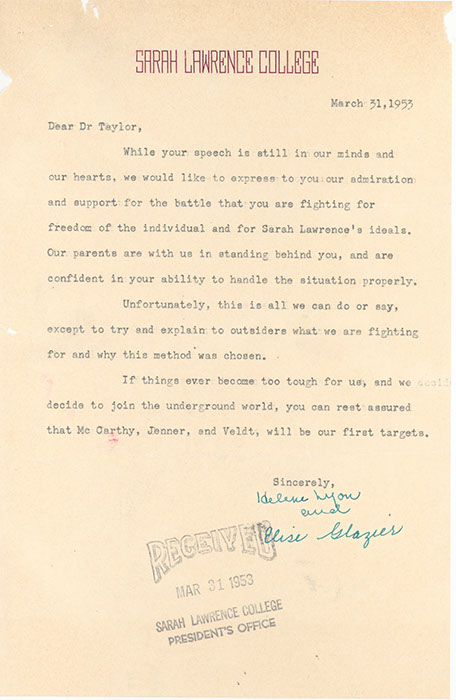
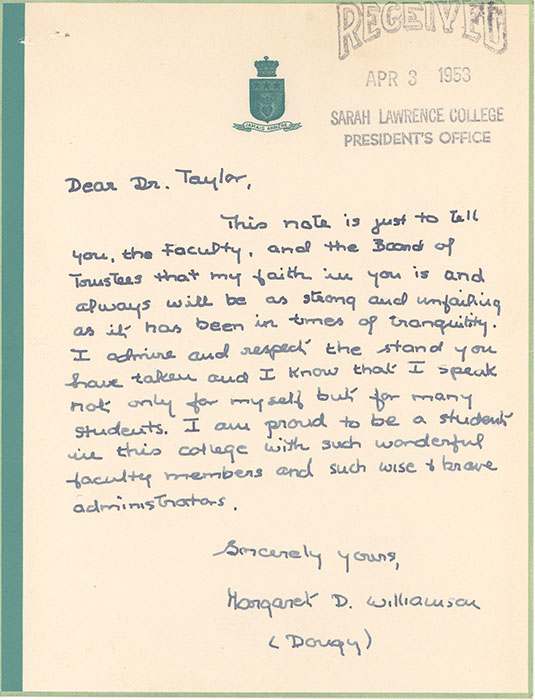
In response to Harold Taylor’s address to the students and faculty at the opening of Spring Term, March 31, 1953, students Helene Lyon, Elise Glazier, and Margaret (Dougy) Williamson wrote to President Taylor in support of his “fight for freedom.” (Harold Taylor Papers)
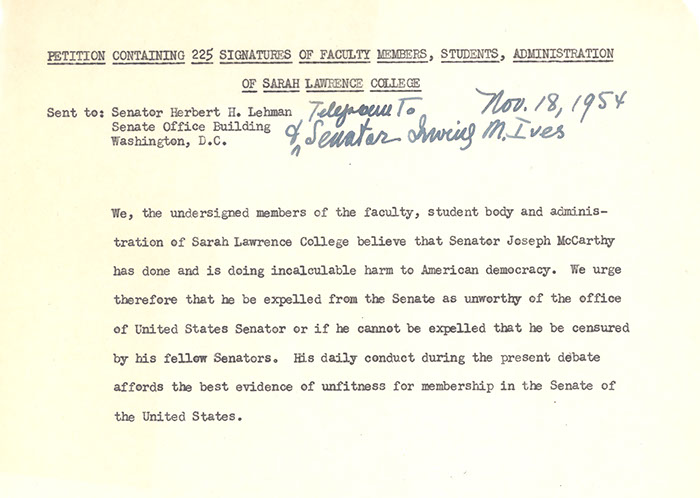
In November, 1954, as a result of discussions among students and faculty on the Senate debates of November, 225 members of the faculty, student body, and administration signed this petition to expel, or censure, Senator McCarthy. The 225 represented approximately 75% of the faculty and 42% of the student body.
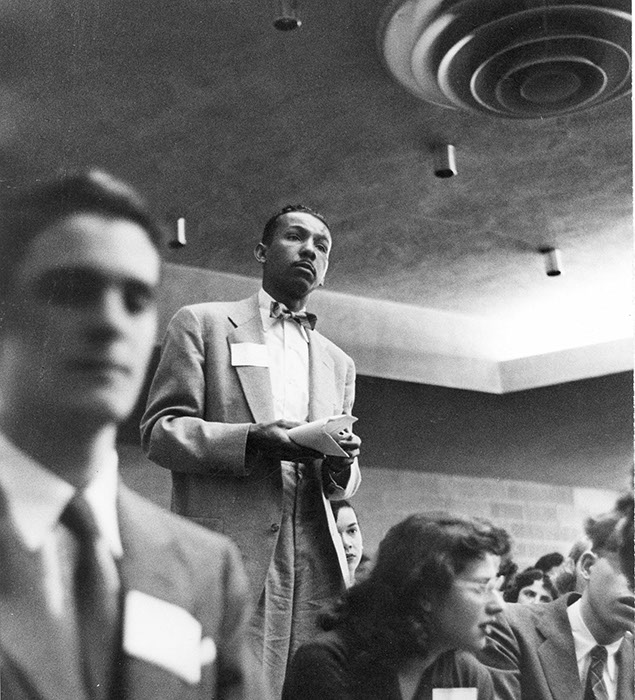
On February 21, 1953, the College held the Intercollegiate Student Conference on Democracy and Communism in the Modern World. The conference grew out of the results of a Student Council questionnaire in late 1952 requesting topics in which faculty and students of other colleges could meet and share ideas. Over 42 colleges sent delegates to the conference along with over 100 Sarah Lawrence students bringing conference participation up to 350. In this image, a participant speaks from the audience.
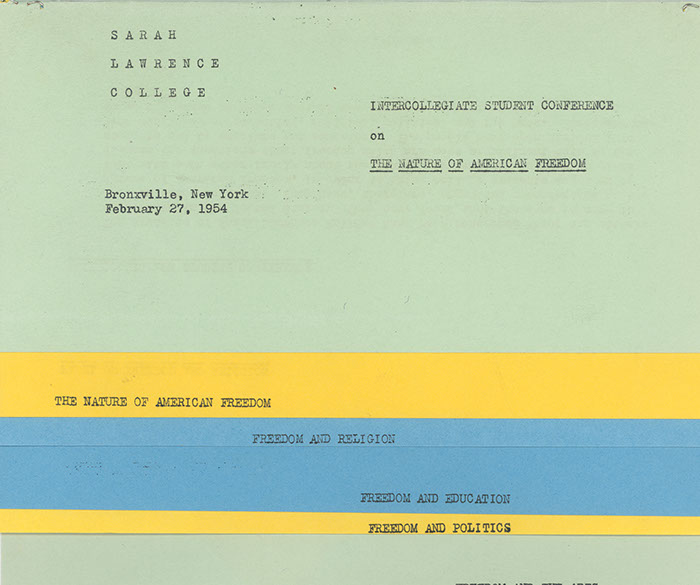
One year after the College held the Intercollegiate Student Conference on Democracy and Communism in the Modern World, the College held a second Intercollegiate Conference, this time on the Nature of Academic Freedom. Held on February 27, 1954, over 45 colleges and universities were represented. The conference tackled such topics as Freedom and the Arts, Freedom and Education, Freedom and Politics, and Freedom and Religion.
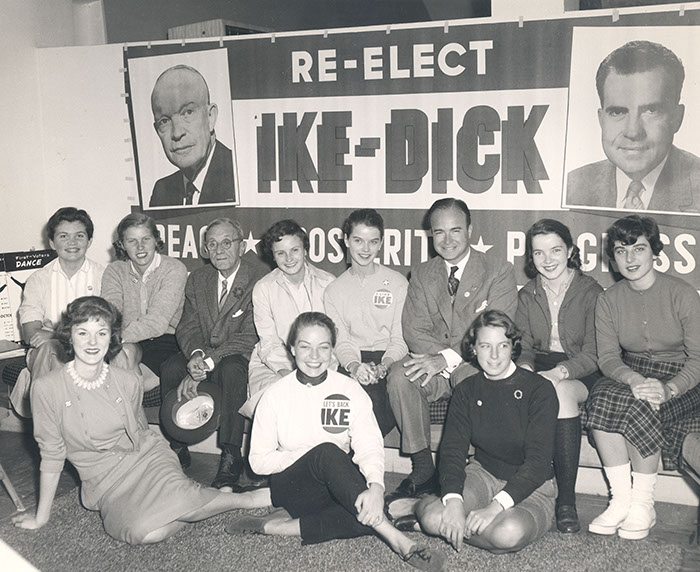
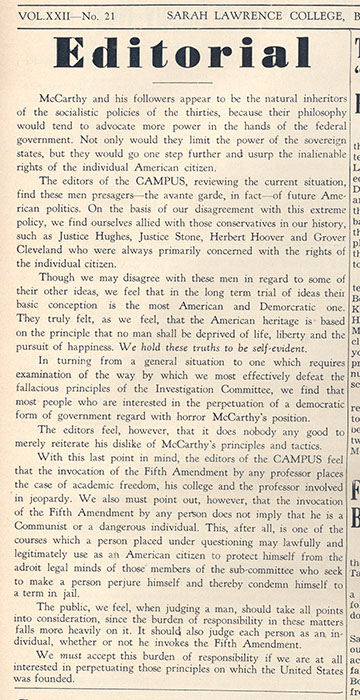
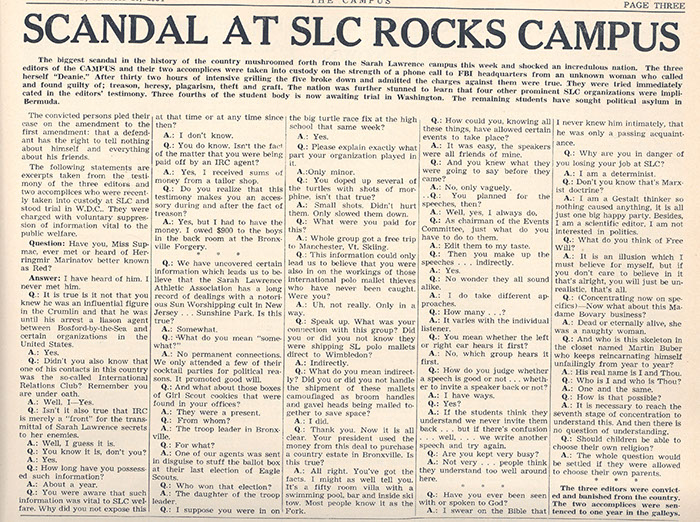
Not only were Sarah Lawrence students interested in McCarthyism and its effects, but they also were very active in the general political arena. Here are a number of students who supported the re-election of President Eisenhower and Vice President Richard Nixon in the mid-1950s.
Image 2 shows an example of one of the many editorials in The Campus on the subject of McCarthyism. This editorial announces the support of The Campus of those who invoke the Fifth Amendment during hearings.
Image 3 is one example of a satirical approach to the impact McCarthyism was having on the College campus. This article was published in The Campus on March 10, 1954.
Community, Parents, and Alumnae/i React
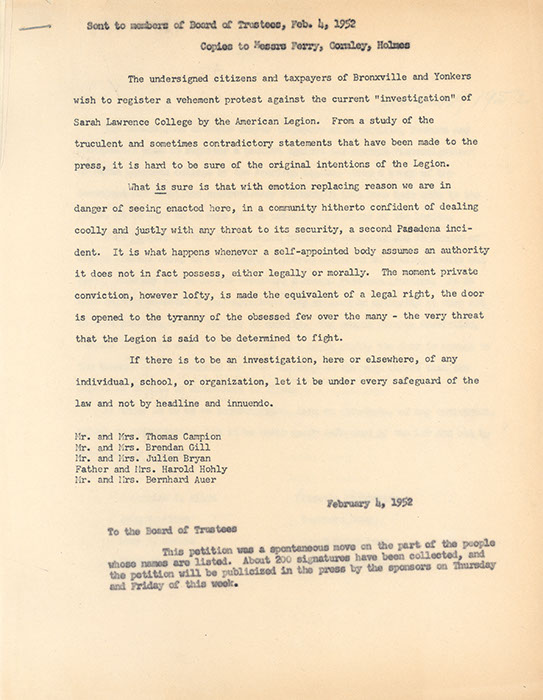
Community Shows Support for the College
In response to the American Legion’s attacks on Sarah Lawrence College, the Bronxville and Yonkers communities fought back to restore the College’s integrity. Most notably, along with the spontaneous formation of the Citizens’ Committee of Bronxville and Yonkers in February, 1952, 175 citizens of Bronxville, Yonkers, and Eastchester signed a petition challenging the Legion’s right to investigate the College. Despite assaults from individual members of the community and the American Legion, the communities of Yonkers and Bronxville, as a whole, supported the College throughout the ordeal. Individual members of the Legion, including Reverend Hohly, a prominent figure in Westchester County, argued that the attacks had gone far enough and should be stopped unless concrete evidence was found.
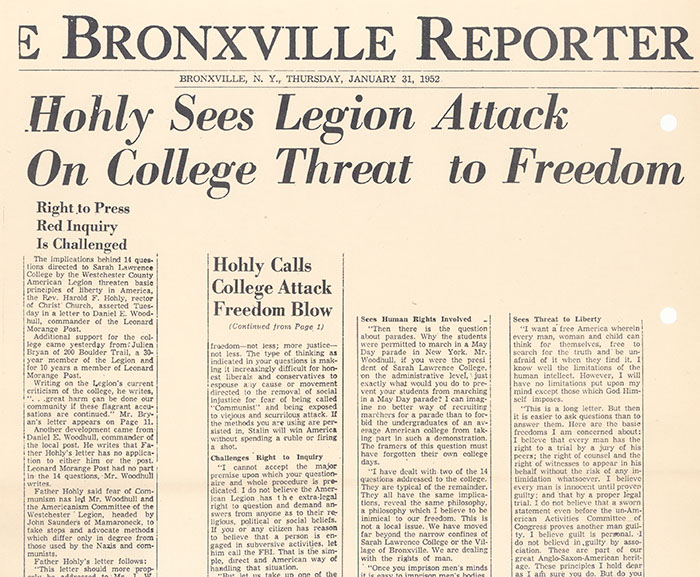
Nationally, the College was recognized for its efforts to combat the attacks on academic freedom. In April, 1952, the American Civil Liberties Union awarded the College a citation for a “powerful effort in behalf of academic freedom.” In addition, the American Association of University Professors commended the Sarah Lawrence College administration, along with other colleges, for “supporting faculty members when they were under accusation” in 1956. Fellow faculty members at Bard College passed a resolution in support of the Sarah Lawrence faculty members called before the Senate Subcommittee.
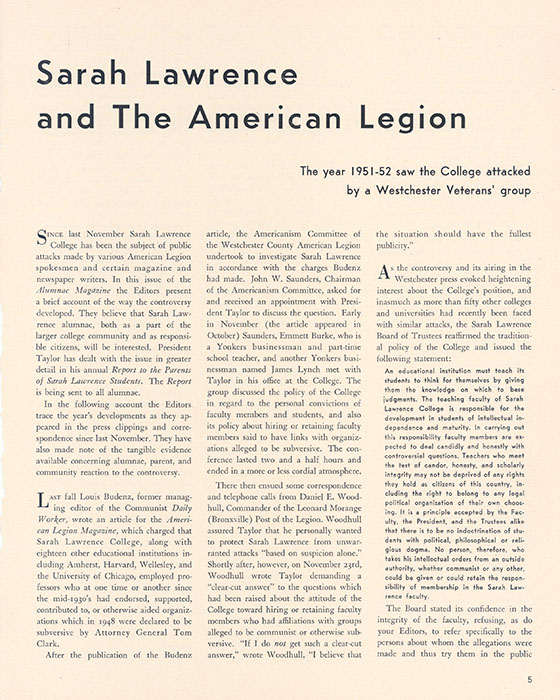
Parents and Alumnae/i Respond
Parents and alumnae/i of the College responded to the crisis by offering their support through letters to Harold Taylor and covering the issues in the Alumnae/i Magazine. In return, the College kept the parents and alumnae/i well-informed of the current events through memos sent by President Taylor. At the annual Open Session in February, 1952, parents and friends “questioned the ways in which they could help the College meet attacks on academic freedom. Mrs. Raushenbush responded that ‘the main job is not to be frightened but to continue with the educational work we are doing at the College.’”
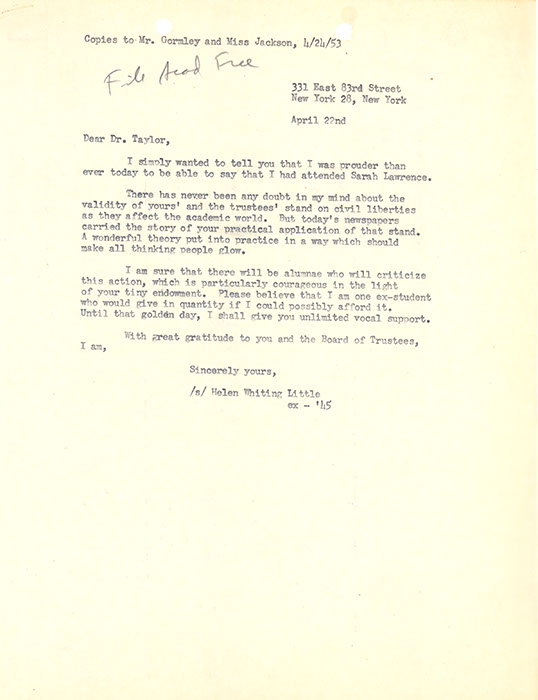
Helen Whiting Little, class of 1945, sent Harold Taylor this letter of support on April 22, 1953. It is one of many letters from alumnae/i who wrote to show their support for the College’s response to the American Legion’s attacks and the Senate Internal Security Subcommittee’s accusations.
President Taylor and the Trustees Stand Behind the Faculty
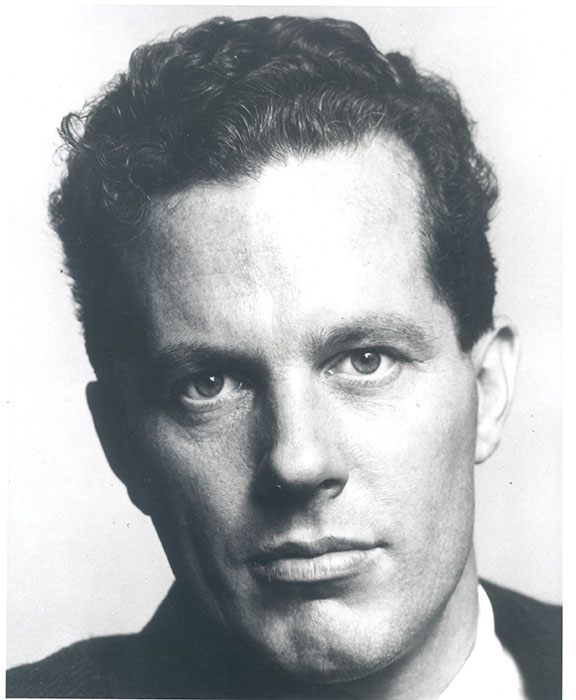
During Harold Taylor’s tenure at Sarah Lawrence College, he spent much of his time combating attacks on College faculty from the American Legion and the Senate Subcommittee. Throughout the ordeal, he kept the Board of Trustees, faculty, students, alumnae/i, and parents of students well-informed of the events and the consequences. He consistently supported the faculty when they were attacked.
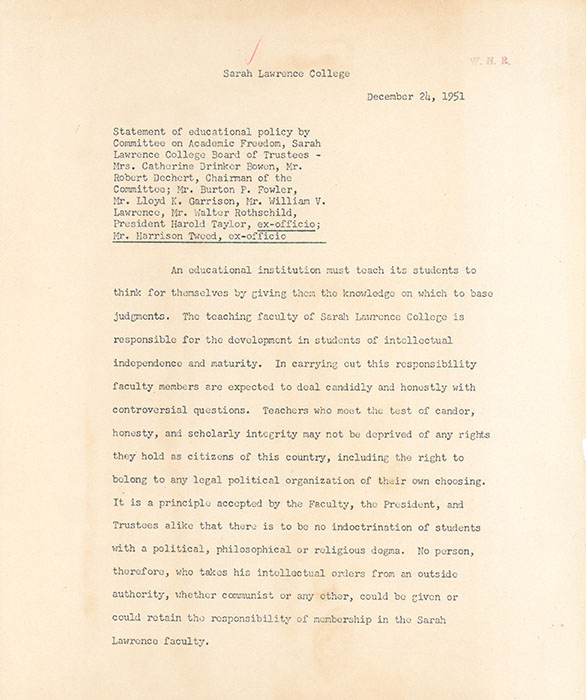
Taylor fought hard to keep Congress and outside non-educational agencies, such as the American Legion, out of the classroom. He believed it was not their place to judge the merits of a teacher on whether or not they were communists. Not only did Taylor support his own college and faculty, but he became a national figure in the fight for academic freedom. Before Sarah Lawrence became a target, he was well known for his stand on academic freedom. He traveled across the country lecturing on the importance of maintaining freedom in educational institutions as well as writing numerous articles on the subject. Taylor was seen as a prominent figure in the fight for academic freedom across the nation and was exceptional in his support of his faculty in these difficult times.
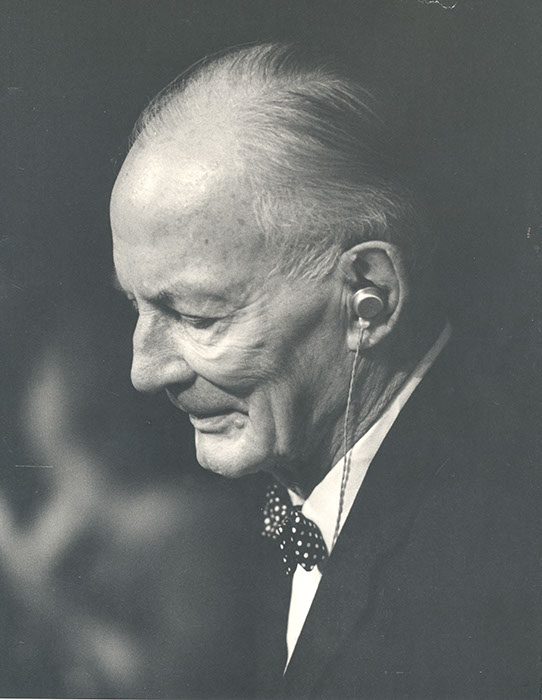
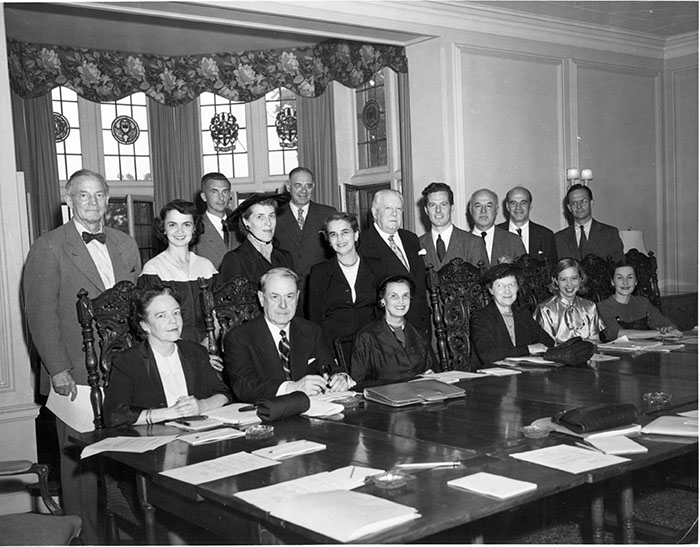
The Board of Trustees also remained vigilant in their support of the faculty and, through the Trustee Committee on Academic Freedom adopted the revised policy statement. There was constant communication between the Board and President Taylor about attacks on faculty and the College. An effort was made to come to decisions jointly. Like Harold Taylor, the Board of Trustees is considered unique in its approach to the attacks on academic freedom on the college campus.
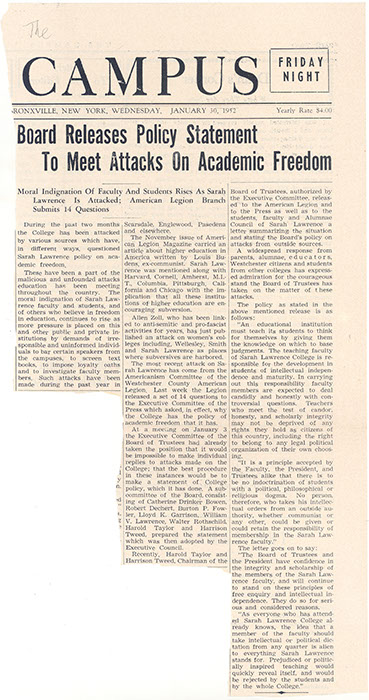
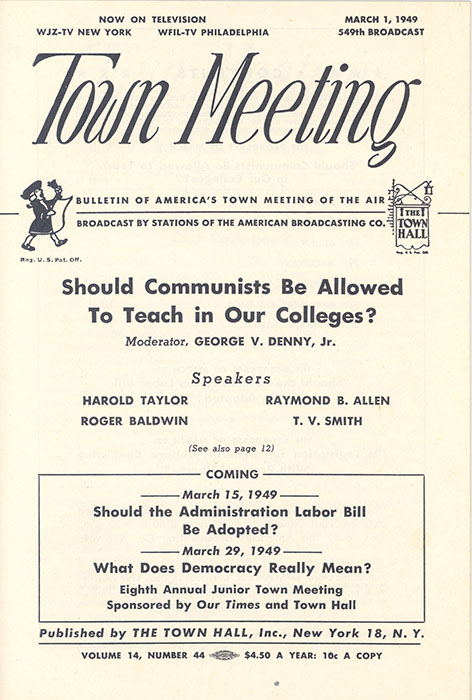
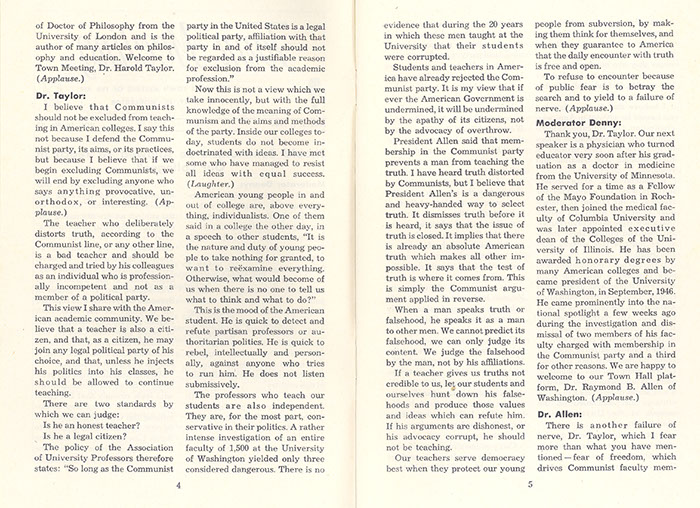
January 30, 1952, the College Board of Trustees released a letter for publication in The Campus that included a copy of the policy statement on academic freedom they had developed in response to criticism and attacks from the Westchester County American Legion.
On March 1, 1949, before any of the trouble began at Sarah Lawrence College, Harold Taylor appeared on a broadcast of Town Meeting on the topic, "Should Communists Be Allowed to Teach in Our Colleges?" Images 2 and 3 show the flyer and partial transcript from the broadcast.
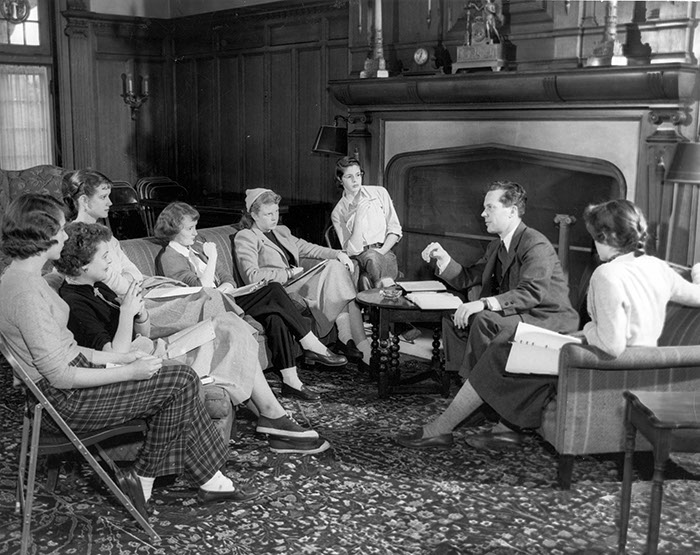
“I have one last thing to say. I believe that the most important possession we have at Sarah Lawrence College is our political and intellectual independence and our freedom to carry out a democratic educational program. We can only preserve this independence and this freedom if we all stand together as students and faculty against the attacks on this freedom from whatever quarter they may come.”
—Harold Taylor, All-Student Meeting, November 20, 1951
This quotation from Harold Taylor, which summarizes Taylor's stand on the issue of academic freedom is from a flyer entitled, "To Safeguard These Rights..." by the Bureau on Academic Freedom.
"There are a great many groups outside our colleges which would like to control the minds of teachers and students by doctrines and dogmas decided upon by themselves. If our schools and colleges are to develop a strong and robust youth, able to think and act democratically, we must resist with all our might any attempt on the part of others to take away our rights and responsibilities as educators. The teachers scholars, scientists, and educators and those to whom the making of educational policy belongs -- they are the ones who must decide the issues of academic freedom, without interference by those whose philosophy is based not upon tested knowledge and patient enquiry but upon fear, anxiety and dogmatism."
—President Harold Taylor, "To Safeguard These Rights..." Undated
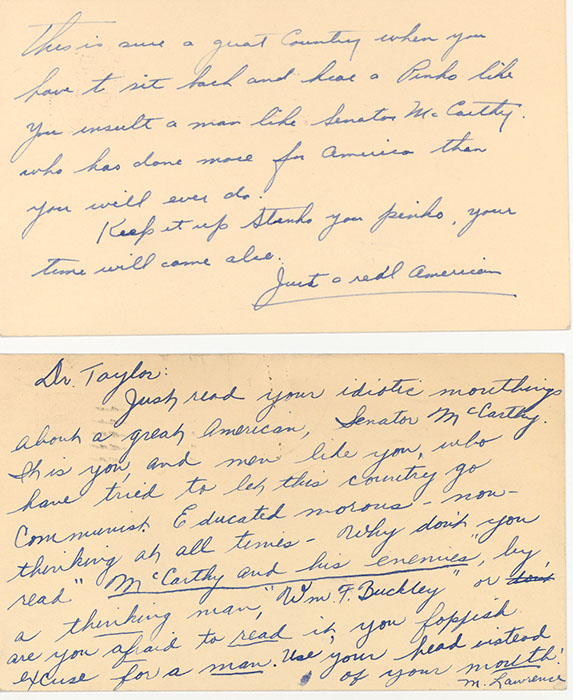
Text of top card: “This is sure a great Country when you have to sit back and have a Pinko like you insult a man like Senator McCarthy who has done more for America than you will ever do. Keep it up stinko you pinko, your time will come also. (signed) Just a real American”
Text of bottom card: “Dr. Taylor: Just read your idiotic mouthings [sic] about a great American, Senator McCarthy. It is you, and men like you, who have tried to let this country go Communist. Educated morons – non-thinking at all times. Why don’t you read “McCarthy and his enemies,” by a thinking man, “Wm. F. Buckley” or are you afraid to read it, you foppish excuse for a man. Use your head instead of your mouth. (signed) M. Lawrence”
In an address to the students and faculty at the opening of Spring Term, March 31, 1953 President Taylor delivered the following remarks:
“We are a close and happy community here. We are knit together in a common loyalty to each other, to our College, and to the United States. We are varied in our attitudes, we have strong opinions on practically everything. We have supporters of Taft, of Eisenhower, of Stevenson, of Erich Fromm, of Freud, of existentialism, of Episcopalianism, of Judaism. We also have supporters of the Stork Club, of Fort Lauderdale, Danny Kaye, of Yale, of Harvard, and of City College. It may even be said that at times, when each of us is at his worst, individuals may actively dislike each other and despise each other’s opinions. This too is permitted. But underlying it all there is a sense of unity, and of belonging here, and of believing in each other, which marks this College and this community as a special place. In a real sense, we are the inheritors of the liberal tradition which makes the Western world a unity. We exist to pass on to the future the values of love, affection, understanding, reason, generosity and tolerance, at a time in which these values are being undermined both by the communists, by the Soviet Union, and by those who join with Senator McCarthy in attacking men of good will, probity and loyalty to truth.
“Liberalism means, not that you must be a liberal; it means that whether you are a liberal, a conservative or a radical, you believe in the application of human intelligence to human problems, you believe in judging men by their acts and by what they say, not by what they are merely accused of doing and of saying. It also means that you have faith in honest people whom you know well and who know you.
"We are in for some trouble about all this. So is Vassar, Harvard, Columbia, Yale, and every other college or university where there are men and women who think, teach and act according to their own convictions. But the struggle, here and elsewhere, is worth while, in fact it is the most worth while of all. It is part of the world struggle for independence and courage against ignorance and fear. I know from my past two weeks of experience with my colleagues here, whom I have come to love and admire more than I can say, that we can win it, that we can keep our integrity inviolate, that we can make our friends around the country understand why we are doing what we are doing. I will tell you at any time everything I know which you need to know about your College and its work. I only ask in return that you trust us – your teachers, your trustees – and yourselves, to judge the good and the bad, the true and the false, when they are put to such an intensive public test.”
-Harold Taylor, Address to students and faculty at the opening of Spring Term, March 31, 1953